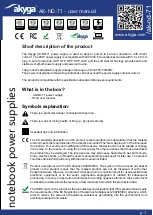
6
with plenty of soap and water!
•
Never wear rings, necklaces, watches or similar
when handling batteries or chargers. The short-
circuiting of the battery contacts brings a risk of
burns and explosion!
•
The power pack is only designed as a jump-start
for a vehicle that has a battery of its own. The
power pack cannot replace the vehicle battery.
•
Always store the pole callipers in the designated
holders to ensure that the power pack is not at
risk of short-circuiting when not in use.
•
Never attempt to jump-start a vehicle when the
battery is frozen, this brings a risk of explosion.
•
Always observe the following sequence when
disconnecting the power pack from the bat-
tery. There is a risk of explosion: Switch off the
jump-start function on the Power Pack. First dis-
connect the black (-) pole calliper, coil the cable
and attach the pole calliper to the designated
holder. Then disconnect the red (+) pole calliper,
coil the cable and attach the pole calliper to the
designated holder.
6. MANUAL
6.1 OVERVIEW
1 Pole clamp (+) red
2 Rotary switch jump-start
3 Charging indicator light
4 Control lamps for charging status
5 12 V sockets
6 Push-button switch charging status
7 USB output with control lamp
8 ON/OFF switch USB connection
9 Storage compartment 230 V charging cable
10 Pole clamp (-) black
6.2 CHARGING THE POWER PACK
Charge the power pack for 24 hours before you use it for the
fi rst time. To do this, place the power pack in a well-ventilated
location. Open the storage compartment for the 230 V char-
ging cable (Position 9 in the overview) and remove the char-
ging cable. Insert the plug of the cable into a 230 V socket. The
charge control lamp (Position 3 in the overview) now lights in
red. After 24 hours, disconnect the mains plug, stow the cable
in the storage compartment without kinking and close the lid.
Press the push button (Position 6 in the overview) for the char-
ging status indicator (position 4 in the overview). If the green
control lamp lights up, the power pack is ready for use.
In order to ensure that the power pack is always able to provi-
de its full power performance, charge for at least 5 hours after
each use (to jump-start a vehicle).
6.3 CHECKING THE CHARGING STATUS
The charging status of the battery cannot be checked during
charging. First disconnect the 230 V charging cable from the
socket before checking the charging status.
To check the charging status of the power pack, press the but-
ton for the charging status (Position 6 in the overview) while
the mains is unplugged. The indicator lights for the charging
status (Position 4 in the overview) indicate the status of the
battery:
Low (red):
The battery must be charged as soon as
possible
Middle (yellow):
Charging the battery is recommended
High (green):
It is not necessary to charge the battery
The jump-start function of the power pack
is designed only for vehicles with a 12 V
on-board voltage. Before using, consult
the operating instructions of your vehicle
to determine whether, and if so, how an
external jump-start is to be used. Modern
vehicles have sensitive electronics and
control devices that may be damaged if the
wrong procedure is used.
6.4 JUMP-START
Make sure that the power pack is fully charged. To do this, press
the control button for the charging status (Position 6 in the
overview). If the charging control lamp (Position 4 in the over-
view) lights up „high“ green, the power pack is ready for use.
Figure 1: Overview
6.5 CONNECTING THE POWER PACK (VEHICLES WITH
NEGATIVE EARTH)
Switch off the ignition and all electrical consumers of the
vehicle (radio, lights, rear window heating, seat heating etc.).
Apply the parking brake.
Make sure that the power pack‘s jump-start
rotary switch (Position 2 in the overview) is
set to „OFF“.

































